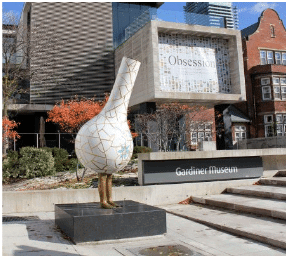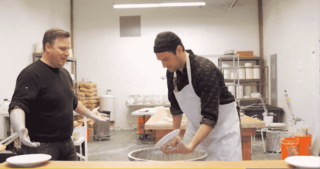So you’ve just seen a live throwing demo, visited an artist’s studio while traveling, or just finished binge watching The Great Pottery Throwdown, and your curiosity is piqued! That muddy material looks oh-so-inviting, and you want to give it a go. Or maybe you’re already an experienced self-taught potter and are looking to expand your skill-base. Perhaps you’ve read an exciting article about a new technique and are looking for some guided instruction. Today, we’re here to help you begin your search, with some great tips to help you find ceramic classes near you, whether you’ve never touched clay before, or you are looking to improve your existing skills.
Know What You are Looking For

Before you begin your search in earnest, it’s a great idea to have a sense of what you are after. You want your class to be something you are excited for, so knowing what interests you and what you can realistically commit to will set you up for success. Do you want a one-off taster session, or are you looking for a weekly commitment to keep you busy for the winter? Are you open to trying all forms of making, or are you really heart-set on learning how to use the wheel, or trying your hand at sculpting the figure? Maybe you’re confident in your foundation skills and are keen to try a master class? As you contemplate these questions, remember to also consider the travel distance to the class, the number of other participants, and if the program includes any studio access outside of class hours. It’s also worth checking out what facilities and equipment will be available to you, and what experience or specialties the instructor brings to the table.
Guilds and Craft Councils

One great place to start when looking for a ceramics course is with the local pottery guild or craft council. Guilds and craft councils can be found in most major cities, and are designed to support makers through all aspects of their craft, whether that be education, exhibiting, funding, and selling. Most of these organizations provide courses directly, typically offered by their members, with many having dedicated community studio spaces. Because guilds and councils are larger organizations which are often in receipt of government support, they frequently have larger and better outfitted facilities than an individual artist may have, which can give you more options in terms of techniques to try. Guilds and councils will frequently have courses offered by a number of instructors, so you can be exposed to a broad range of approaches, and they often have a strong community element to them, which really helps boost your learning experience!
Most guilds and craft councils can be found with a simple Google search of your town plus the keywords: “ceramic guild”, “ceramic association”, “pottery guild”, or “craft council”. You may also wish to search at the provincial/state, or even national level as they can help direct you to organizations or artists in your area. These organizations will usually have their classes listed on their website, but it’s also worth signing up for their newsletter to stay up to date on specialty workshops and exciting events.
Artist’s Studios

Many artists host classes directly from their personal studios, and this is an excellent option if you are looking for smaller class sizes, or are looking to explore a particular method or technique. An added bonus of learning in this setting is that 100% of your fees go to the artist, so if you want to support your local makers while you learn, this is an awesome way to do just that!
There are a multitude of ways to find such artists, as they will advertise through various media. Have a look on Facebook or Instagram, do a google search, talk to artists at craft events or studio tours, or even do a Google Maps search for “Ceramic/Pottery classes near me,” and you are bound to find someone. And if you already tried your local guild or craft council and they aren’t offering any classes themselves, they will happily direct you to any of their members who are. Local craft shops are another great place to ask, as they’ll know if any of their featured artists offer lessons and will be able to provide you with their contact info..
Community Clay Studios

Community studios are not always run by guilds or councils, in fact, many are started by independent artists who love working with others, and love sharing their passion for ceramics. These spaces often have a nice range of courses available, and typically offer drop-in time for you to continue your projects outside of class. It’s common as well, that once you’ve completed a course or two, you can rent a table or shelf for a set period of time, so you can begin to develop your practice further. They’ll often have community events too, where you can get a taste of what the space is like and of what they have on offer, whether that be an open studio day, a beach firing, or a raku demo day.
Community Centres

Many community centers have arts programming, and often that includes clay too! Their offerings will be a bit more limited as they are less likely to have full facilities, but it can be an excellent entry point for many people, and often a very affordable one. These centers typically have programs targeted towards children and families as well, so if you’d like to learn alongside your little ones, this can be the place to start! Check your local community center’s website, Facebook, or Instagram for up-to-date offerings. Many also still print seasonal brochures too.
Community Colleges and Universities

Community colleges and universities are a great place to look for learning opportunities, and there are some fantastic ceramic focused programs out there. And don’t think you have to sign up for an expensive diploma or degree program! Many offer continuing education multi-week programs, led by 1-2 experienced instructors. The facilities can vary, but if it’s an institution that has a fine arts or craft diploma program, they are likely to have a good set-up. You’ll also find a variety of levels and technique-focused courses, so you aren’t limited only to beginner level options. Some schools even offer week-long intensives, so if you’d like to treat yourself to a clay staycation, these can be a great fit! Have a look on the website of your local college or university under “Continued Learning” to see what they have available.
Museums

the-gardiner-museum/
This is one that often gets overlooked, but is an excellent option. Many museums, especially those with a notable ceramics collection, will have ceramic studios devoted to learning. They commonly have kids programming as well, and if they host artists residencies, they’ll likely have 1-2 day artist-led workshops by the current resident, which can give you an excellent opportunity to learn from artists from around the world. And while larger museums such as the V&A in London or the Gardiner Museum in Toronto may seem like obvious options, don’t overlook your smaller local museum. While their facilities may be more limited, they commonly host weekend workshops with local artists, or shorter multi-week programs. Head over to their social media pages or website to see what’s on.
The Ceramic School Directory

Ok, so we’ve saved the best for last! No matter where in the world you are, you can look for clay learning opportunities in our ever-expanding directory. Whether you are looking for community studios, educational centers, individual artists who teach, or even residencies, we’ve got 100s of listings to help get you started. We’re on a mission to make this directory as comprehensive as possible, so be sure to bookmark it and check back often. And if you know of a studio or center in your area who is not yet listed, send them our way so they can add themselves for free!
And of course, if learning options are limited in your area, we have you covered for that too! We have a fantastic collection of online courses available, taught by established artists from around the world, and suitable for every experience level. New courses are being added all the time, so you can keep developing your skills right from your own home or studio.
We hope that this post has helped you begin your search for a great ceramic experience in your area. There are so many artists out there eager to share their love of clay with the world, so whether it’s in your own neighborhood, or online with us, we feel confident you’ll be able to get your hands in clay with a supportive and inspiring instructor! Once you’ve found them, encourage them to sign up to our directory, so we can share their skills with more knowledge-hungry artists like yourself!






Responses